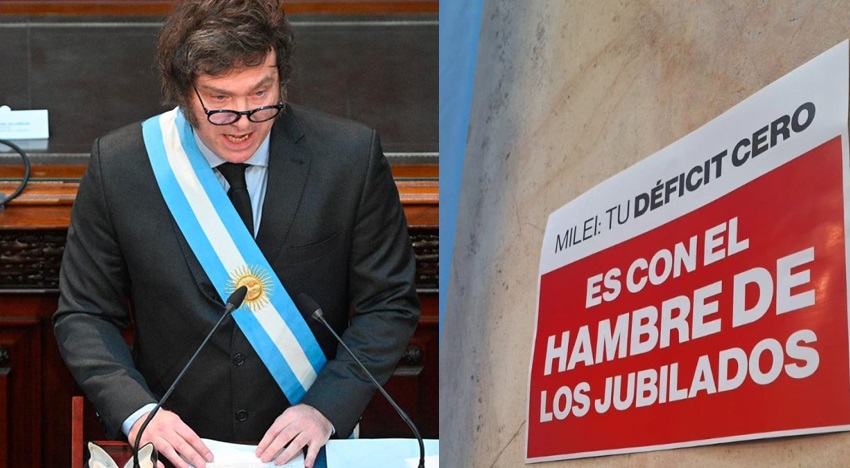
82 days after taking office, the president made the opening speech of the Legislative Assembly in Congress. Without forceful announcements on economic matters, he repeated the liberal script since his inauguration and reaffirmed that he will continue to accelerate the course of “change”: more fiscal adjustment, reduction of the state plant, liberalization of prices and tariffs, along with a horizon of anti-worker labor reforms and forecast.
Among its economic definitions, four fallacies stand out about the impact of its measures. Who pays the adjustment, the caste, or the workers and the poor people?
1. Fiscal adjustment: “It was on the public sector and not on the private sector”
Milei stated that in January they carried out “the deepest reduction in public spending in history” and that this adjustment “did not fall on the private sector.” But the data show something else: Milei and Caputo’s inflationary “blender” on pensions and public salaries explained most of the “fiscal surplus” that the Government celebrates.
According to data published by the Congressional Budget Office (CPO), it appears that of every $100 of financial surplus obtained, $64 was taken from retirees.
“All concepts showed real decreases in the year-on-year comparison, the most significant being those observed in capital expenditures (-75.6% y/y), social programs (-59.6% y/y), current transfers to provinces (-53.3% y/y), retirements and pensions (-32.5% y/y), personnel expenses (-18.0% y/y), family allowances (-17.7% y/y a) and transfers to universities (-16.5% y/y).” indicates the OPC report.
For the first time, in January the State allocated more money to pay debt interest than retirements and pensions.
The adjustment was not paid by the caste. Except for “private sector,” Milei refers exclusively to large companies, which feasted on depressed salaries and sky-high prices.
But his story seeks to insinuate that it is not the workers who drive the economy every day who suffer the consequences of the adjustment. A speech that collides with the reality of increases in food, service and transportation rates, fuel, prepaid bills, rent, among other expenses incurred by working families month after month.
Milei also mentioned the chainsaw of cutting public works. Which further complicated the slowdown in construction and economic activity, which is already beginning to see thousands of jobs in danger.
2. Rentals: “Rental prices fell”
The president recalled that with the DNU the rental law was torn down and consequently, without this regulation, rental prices fell. Nothing could be more opposite to reality. In January alone, rental prices rose 16%. The average rental price of a 2-room apartment in the northern area of Greater Buenos Aires is $335,845 per month, according to Zonaprop’s survey. “Large apartments are the ones with the highest price increase in January,” indicates the report.
In 2023, rents increased around 260% in CABA. The housing drama deepens for millions of families who increasingly allocate a greater part of their income to paying rent. The elimination of the rental law has left tenants subject to the leonine conditions of the real estate lobby, in some areas they even ask for contracts in dollars.
— Inquilinos Agrupados (@InquilinosAgrup) March 2, 2024
3. Retirements: “There are 4 million workers who did not contribute and did not fulfill their duty”
Milei now aims to attack retirements due to moratorium. According to official data, today there are about 3.6 million holders who receive retirements and pensions due to moratorium, according to statistics from the Ministry of Labor. 75% are women.
These are workers who have contributed to society all their lives working, but are invisible to public records. If people about to retire today cannot do so and need a moratorium, it was not by choice, it is because they have worked informally or have been unemployed during certain periods.
In the vast majority, it is also, for having carried out tasks such as cleaning, cooking, caring for children, the sick and the elderly, etc., tasks done fundamentally by women who were not recognized or paid, but who play a fundamental role in the reproduction of the labor force. These women do not have contributions not because they have not wanted to, but because of a patriarchal capitalist system that does not recognize this work done and unpaid.
Furthermore, the pension system is financed largely, and increasingly, with tax resources, which today fall mainly on consumption and regressively on lower-income sectors. Consumption that these people have made, providing resources to the system. It is precisely those who have the least or work precariously, who allocate most of their income to buying goods and services to live. Different from big businessmen and top the lists of evasion and flight.
In the coming years, 90% of women would not be able to access an ordinary retirement because they do not meet the 30 years of contributions required by the system, so the only way to retire is via moratorium.
4. Salaries: “The real salary is 300 dollars, when in the 90s it reached 1,800 dollars”
In another claim of the Menemist caste, which is not the first time that Milei raises publicly, he stated that Menem and Cavallo in the 90s raised salaries to the value of 1,800 dollars. Crazy.
The minimum wage in convertibility was equivalent to 200 dollars and the minimum pensions were equivalent to 150 dollars.
The figures provided by the Ministry of Labor between 1994 and 2001, both registered and unregistered workers earned an average of 600 pesos (equivalent to $600). The only reality is that today the minimum wage is 180 dollars and only with December inflation did salaries on average plummet by 14%, with a deterioration that continued in January and February.
Milei and “his new order” are a declaration of war against the working class that has been bearing the entire weight of this adjustment. He now calls the governors to a fiscal pact seeking to achieve some political consensus to continue overwhelming labor conquests and cutting items such as education, social spending and retirements.
The December devaluation not only overheated prices – which in just two months added 51.3% – consequently sales plummeted because silver was not enough. The recession deepens and March begins with new layoff announcements. They are the consequences of Milei, Caputo and the IMF’s plan, which is why we must confront them in the streets, demanding that the union centers call for a national strike and a true plan of struggle. It is also necessary to promote coordination from below in places of work, study and in the neighborhood assemblies that have been putting up a strong fight against the chainsaw plan.
Source: www.laizquierdadiario.com

